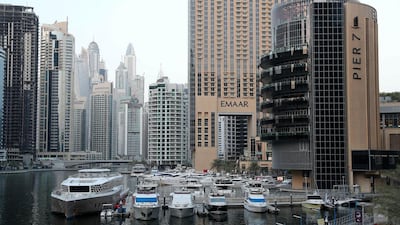New laws governing timeshare properties in Dubai could provide a major boost to the local rental sector, industry figures said.
The new rules, issued last week by Sheikh Mohammed bin Rashid, Vice President and Ruler of Dubai, were introduced to help regulate the sector and cater to investors who want to buy into a holiday home.
The National explains what exactly this means for Dubai's property sector.
What is timeshare?
The timeshare concept originated in the UK in the 1960s and has gained popularity in Europe and elsewhere.
It often allows for partial ownership of a property and use for a certain period of the year.
A timeshare is seen as a more flexible and affordable option than buying a holiday home outright, but with much more attachment to a property than renting through an agency or website such as Airbnb.
For many years, timeshares were popular in Spain and Portugal in particular, appealing to families and retired couples trying to avoid expensive hotels.
They have largely been replaced by the Airbnb sector, although the concept still has some appeal today.

Do I have to buy into the property?
When someone takes a timeshare they do not necessarily buy into the property.
Instead, they typically buy into a membership or a points-based programme offered by a timeshare company or landlord.
The terms and conditions of their membership will specify the options on the type of property they can stay at, its location and the duration of stay.
Such a model is likely to appeal to families or couples looking for extended stays of at least a few weeks.
There are timeshare models in Europe where several owners buy and split a property then divide up the year between them, but there are few known examples in the UAE.
How common are timeshares here?
“Timeshares are not very common in this region, although there are timeshare operators in the UAE with property listings in the likes of Dubai Marina, The Palm Jumeirah and Jumeirah Lakes Towers,” said Aditi Gouri from property agent Cavendish Maxwell.
“These cater mainly to western tourists and expats who enjoy Dubai as a vacation destination year after year.”
Why were new regulations brought in?
The new ruling means Dubai Tourism will create a database of all properties operating as timeshares in the emirate. Permits for up to four years will be issued.

Timeshare properties will also be subjected to regular inspections by Dubai Tourism, as hotels are, to ensure compliance with the rules.
“There has been a need to regulate this industry in the UAE, as has been done in other countries, to protect all parties involved. That is why the new laws are welcome,” Ms Gouri said.
“The new regulations will serve as another step to make Dubai an attractive tourist destination, which vacationers can return to time and again.”
Who will this appeal to most?
Lewis Allsopp, chief executive of Allsopp & Allsopp, said the recent changes to visa rules makes the city more appealing to people planning extended stays, flexible workers and older couples.
“The government of Dubai and the UAE have introduced a number of new initiatives and regulations in recent months that will act as a spur to the economy and to encourage investment and tourism to the city,” he said.
“Timeshare teamed with retirement visas, remote working visas, full foreign ownership of businesses and the potential overhaul of personal and family law is a further step towards the continual growth of Dubai.”
Tara Marlow, head of real estate at law firm Al Tamimi & Co, said the new regulations would help to bring timeshares in line with existing rules in Dubai.
“The new timeshare law introduces a licensing regime for Dubai that regulates timeshare providers and the timeshare property itself, in a similar way to that already in place for holiday homes here,” Ms Marlow said.
“Timeshare providers and all properties available under the timeshare programme will have to be fully licensed. The timeshare agreement will also need to be registered with the Dubai Land Department.”














